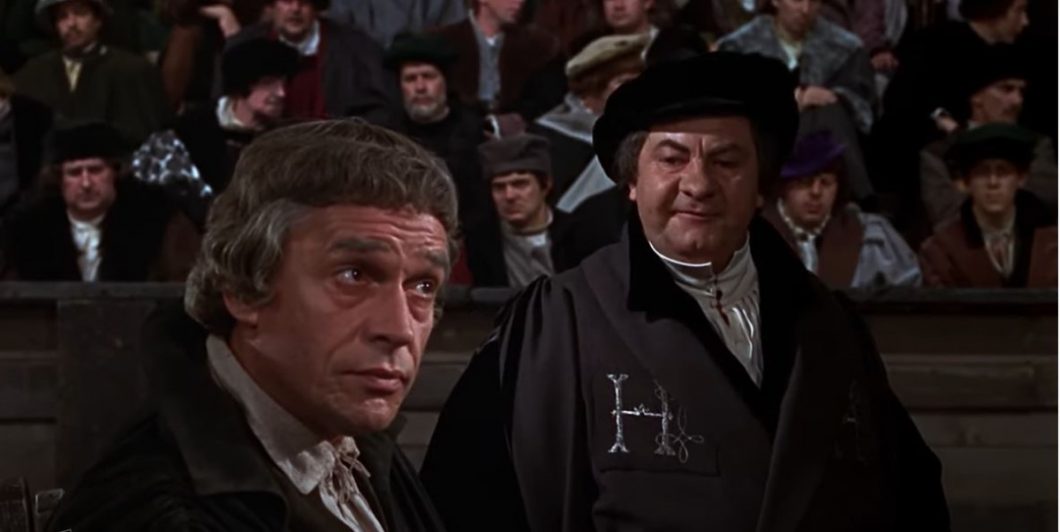Liberty and Conscience—For All Seasons
Eleanor Everett Schneider’s excellent and measured review, “A Wolf For All Seasons,” of Hilary Mantel’s Wolf Hall trilogy got me to thinking about why I loved Robert Bolt’s 1960 play, A Man For All Seasons. I realize that Bolt was not doing history, and certainly by the standards of our time, there were things that the historical Thomas More politically advocated, and indeed practiced, that must be morally rejected. However, all this being said, and in spite of our current woke world, I find the character of Thomas More as presented by Bolt moving and philosophically important.
To begin with, as Robert Bolt notes in the preface to his play, the Thomas More he wrote about was a man
with an adamantine sense of his own self. He knew where he began and left off, what area of himself he could yield to the encroachments of his enemies, and what to the encroachments of those he loved. It was a substantial area in both cases, for he had a proper sense of fear and was a busy lover. Since he was a clever man and a great lawyer he was able to retire from those areas in wonderfully good order, but at length he was asked to retreat from that final area where he located his self. And there this supple, humorous, unassuming and sophisticated person set like metal, was overtaken by an absolutely primitive rigor, and could no more be budged than a cliff.
I trust that this audience is familiar with, or at least knows of, Robert Bolt’s play, and if not the play, then certainly the 1966 film version directed by Fred Zinnemann and for which Bolt was the Oscar-winning screenwriter. It featured the outstanding performance of Paul Scofield as Thomas More. Bolt’s work is mostly a fictional drama, but it is inspired by the actual Thomas More’s refusal to support Henry VIII’s divorce and uses accounts by More’s daughter and son-in-law. However, it is much more than that. As already suggested, it is a work of philosophical insight that raises fundamental questions about the place of morality in human life and in the political/legal order. It was one of the reasons I became a philosopher, and it continues to inspire me to this very day.
I first read the play and saw the film about 55 years ago. I have used both the play and the film successfully for Liberty Fund colloquia, for film series I have directed, and even for some courses I have taught. At the end of this brief effort, I will note some of the things I have learned from this work. But first, I would like to share some passages (without the stage directions) from the play that have substantial import for our understanding of human nature, morality, political philosophy, and law.
- “More: Well . . . I believe, when statesmen forsake their own private conscience for the sake of their public duties . . . they lead their country by a short route to chaos . . . .”
- “More: And what would you do with a water spaniel that was afraid of water? You’d hang it! Well, as a spaniel is to water, so is a man to his own self. I will not give in because I oppose it—I do—not my pride, not my spleen, nor any other of my other appetites but I do—I!”
- “More: For Wales? Why, Richard, it profits a man nothing to give his soul for the whole world . . . But for Wales!”
- “More: Oh, now I understand you, Will. Morality’s not practical. Morality’s a gesture. A complicated gesture learned from books . . . .”
- “More: But since in fact we see that avarice, anger, envy, pride, sloth, lust and stupidity commonly profit far beyond humility, chastity, fortitude, justice and thought, and have to choose, to be human at all . . . why then perhaps we must stand fast a little—even at the risk of being heroes.”
- “More: What, Cromwell? Pooh, he’s a pragmatist—and that’s the only resemblance he has to the Devil, son Roper; a pragmatist, the merest plumber.”
- “Margaret: Father, that man’s bad. More: There is no law against that. Roper: There is! God’s law! More: Then God can arrest him. . . . Alice: While you talk, he’s gone! More: And go he should, if he was the Devil himself, until he broke the law! Roper: So now you’d give the Devil benefit of law! . . . . More: Yes, I’d give the Devil benefit of law, for my own safety’s sake.”
- “Cromwell: There are no rules. With rewards and penalties—so much wickedness purchases so much worldly prospering . . . . No, it’s not like that, it’s much more a matter of convenience, administrative convenience. . . . [T]he constant factor is this element of convenience.”
- “More: The world must construe according to its wits. This Court must construe according to the law. . . . The law is not a ‘light’ for you or any man to see by; the law is not an instrument of any kind. The law is a causeway upon which, so long as he keeps to it, a citizen may walk safely. . . .”
- “Cromwell: The conscience, the conscience . . . More: The word is not familiar to you? Cromwell: By God, too familiar! I am very used to hear it in the mouths of criminals! More: I am used to hear bad men misuse the name of God, yet God exists. In matters of conscience, the loyal subject is more bounden to be loyal to his conscience than to any other thing. Cromwell: And so provide a noble motive for his frivolous self-conceit! More: It is not so, Master Cromwell—very and pure necessity for respect of my own soul. Cromwell: Your own self, you mean! More: Yes, a man’s soul is his self! Cromwell: A miserable thing, whatever you call it, that lives like a bat in a Sunday School! A shrill incessant pedagogue about its own salvation—but nothing to say of your place in the State! Under the King! In a great native country! More: Is it my place to say ‘good’ to the State’s sickness? Can I help the king by giving him lies when he asks for truth? Will you help England by populating her with liars?”
A Man For All Seasons has even more to offer than what these passages can convey, and if one sees the film, the performance by Scofield allows one to experience a man who is self-perfecting without self-aggrandizing, courageous but cautious, and simultaneously principled and practical. We have the concrete presentation of a moral ideal where abstractions are made real. We have Aristotle’s man of practical wisdom.
Bolt’s historically informed account of More’s championing of the law in his defense against Cromwell’s charge of treason reveals a foreshadowing of the ethical insight of natural rights classical liberalism, though without the social-contract theorizing of either Hobbes or Locke.
There is, however, another dimension to this work, for one grasps the possibility that one can hold a view of human nature and personal responsibility that calls for a robust role for morality in personal and social life, and yet still sees the legal order not as an instrument for making men moral but as providing protection for their own self-directed pursuit of a morally worthwhile life. To be sure, this is no easy matter. Recognizing this possibility requires conceptual sophistication, and making it a reality requires true statesmanship. Bolt makes this abundantly clear early in the play when he has More answer Cardinal Wolsey that he would indeed like to govern the country with prayers and has Wolsey retort, “I’d like to be there when you try.”
Governing requires that the statesman be both principled and practical, but here the principle is not to be understood apart from the basic problem for which it is supposed to supply the solution—namely, how to establish a political/legal order that has an ethical grounding and at the same time recognizes that each individual has a conscience to which he must morally answer. To put it in neo-Aristotelian terms, even though abstractly we may speak of human flourishing that is common to all human beings, human flourishing only exists uniquely in each human self or soul, and it is to the perfection of this self or soul that each of us is ultimately answerable. So, the statesman must be morally principled without being a moralist. As already proposed, this means that the moral perfection of human beings is not the aim of the state or political/legal order. Here is the point of Bolt having More speak of the law as a causeway and not as a light, as well as having More emphatically insist that he would “give the Devil benefit of law.” Bolt’s historically informed account of More’s championing of the law in his defense against Cromwell’s charge of treason reveals a foreshadowing of the ethical insight of natural rights classical liberalism, though without the social-contract theorizing of either Hobbes or Locke.
A Man for All Seasons remains heady stuff because it provides in a powerful artistic form an antidote to a culture that increasingly tends to see no room for conscience in social and political life. We need not only to reject ethical relativism and personally and socially be willing to take a moral stance, but we also need to reject the various forms of amoral pragmatism. Contrary to what Cromwell implies, we should see that some facts have moral features embedded in them and that human personal, social, and political life is much more than merely a process of finding the most efficient means to whatever ends are desired. Administrative convenience will not suffice.
Finally, if we realize that the positive law and the actions of the political/legal order are subject to moral appraisal and thus can be found wanting, then we must not be satisfied with Cromwells. Indeed, we need to recall Jefferson’s claim that we have the right to alter or abolish a form of government not dedicated to establishing and protecting individual rights. However, this requires the acceptance of the possibility of situations that might require that we be heroes in one way or another. This does not mean, though, that we must throw ourselves in the path of a juggernaut. Again, Bolt has More offer wise counsel when he notes that God made man “to serve him wittily, in the tangle of his mind! If he suffers us to fall to such a case that there is no escaping, then we may stand to our tackle as best we can, and yes . . . then we may clamor like champions . . . if we have the spittle for it. . . . But it’s God’s part, not our own, to bring ourselves to that extremity! Our natural business lies in escaping. . . .”
Truly, this is a work for all seasons.


